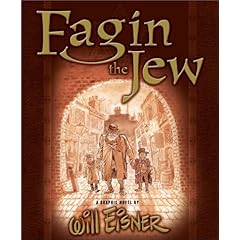
I struggled with a way to start a writeup about this book. Since I'm not as familiar with Will Eisner as I should be, I tend to fall back on hyperbole and hobby-approved nicknames and sound bites while introducing this book to an audience which may not know him. The truth is, reviews read best when the writer is speaking from the heart, and while much of Eisner's work, most especially his layouts and structure, intrigues me, his character work is so idiosyncratic, and so based on caricature, that I find it hard to embrace.
That said, there's nothing technically wrong with Fagin the Jew, a 2003 "biography" of one of the sympathetic villains from Charles Dickens' Oliver Twist, and a great deal that's interesting. I think it's fascinating to see fictional characters make such a cultural impact that other commentators, whether we're talking about Eisner or William Baring-Gould, wish to create a detailed life story behind them. The story is framed as an interview that Fagin gives to Dickens while he's awaiting the hangman's noose.
Eisner was attracted to this story because it gave him a chance to address our culture's long-standing anti-Semitism, and how stereotypes like Fagin have done so much over the centuries to reinforce it. It's really interesting seeing Fagin plead for a little more fairness from Dickens and his audience. The story within the frame is a good one, too. I haven't read Oliver Twist in many, many years, but I recall enough to be impressed by Eisner's skill at crossing Fagin's paths with that young hero, and doing it in a casual way that never feels forced or fake.
My problem is that Eisner's art keeps me at arm's length. I can't quite define exactly what it is, and so this paragraph might baffle you, but I'm reminded of classic Walt Disney cartoons in the way that the characters' body language is slightly exaggerated. His characters move with an unreal sense of proportion to the action, as if they're reminding readers that they're still moving. If you'll recall, there's a hilarious moment in an episode of D.R. and Quinch by Alan Moore and Alan Davis where a much-loved A-list actor reads a piece of a screenplay, and Davis gives him a full page to emote with the dials turned up to eleven, his body raging, fists pounding and teeth clenched. I didn't realize until I read this book just how damn clever that page is, because the actor, Marlon, is only like that when the audience is watching him on that page, and is otherwise a slow, brooding, natural figure in the comic. When I read Fagin the Jew, I saw everybody on the page performing for an audience, and even small, private business is conducted with unreal gesticulation and posing. Coupled with Eisner's heavily stylized characters - I see a lot of similarities with Jack Davis and wonder how much each influenced the other in the 1950s and 1960s - I found it impossible to be absorbed by the story. It can never be the life of Fagin, because every page reminds me that it is a comic book adaptation of the life of Fagin.
If that sounds unduly harsh and critical, it's not meant to be, it's just that I ramble on when I'm looking for the right words. Eisner's research and recreation is amazing, and I do love the detail in the period costume and architecture. It is, truly, a fascinating little story, and this may be a case where my personal preferences in art are overwhelming an honest, objective approach to recommendations.
Fagin the Jew is out of print currently. My copy was a Christmas gift from my awesome brother-in-law, and I would recommend that Dickens fans track down a copy, just as I feel Sherlock Holmes fans would enjoy William Baring-Gould's biography. I'm not familiar enough with Eisner's work to know how it relates to the whole, but my feeling is that it's not quite as essential as A Contract With God or Last Day in Vietnam.
No comments:
Post a Comment